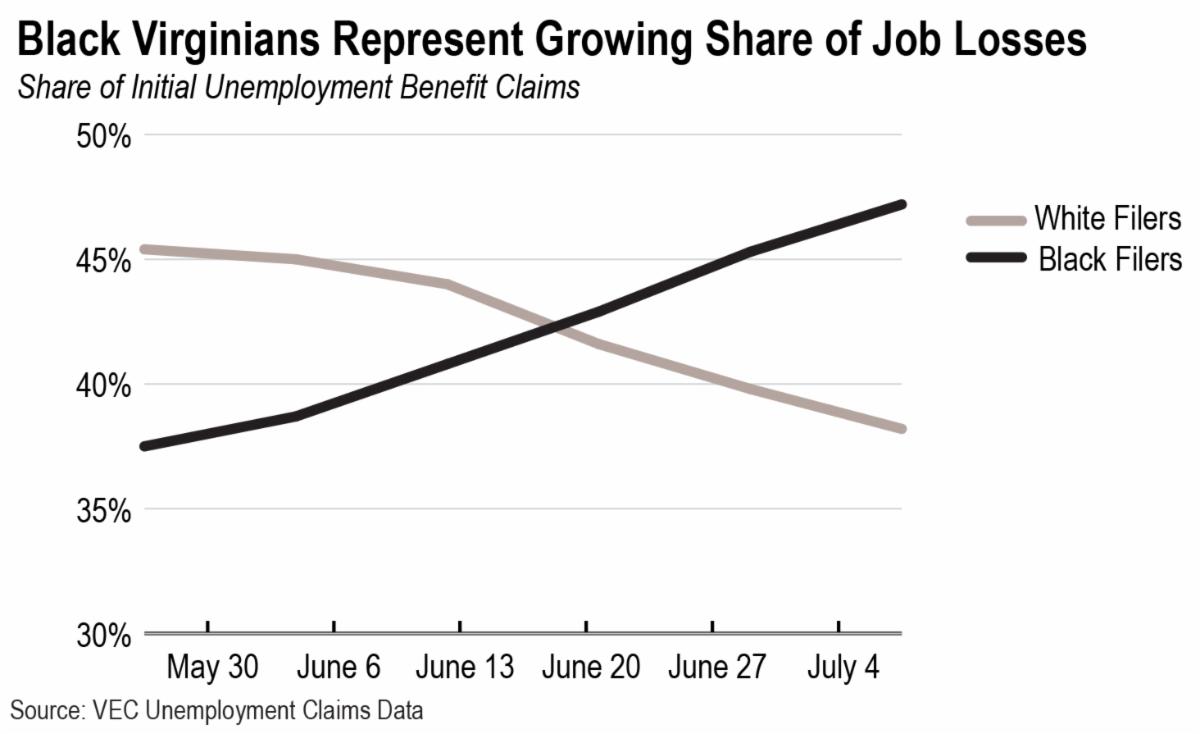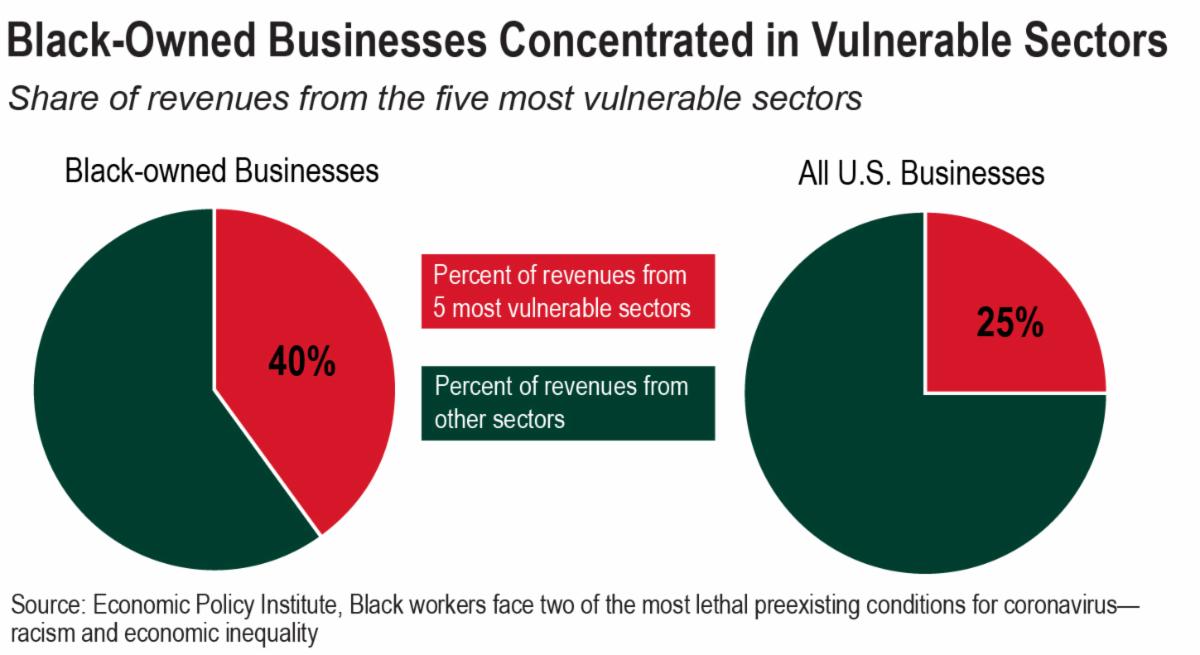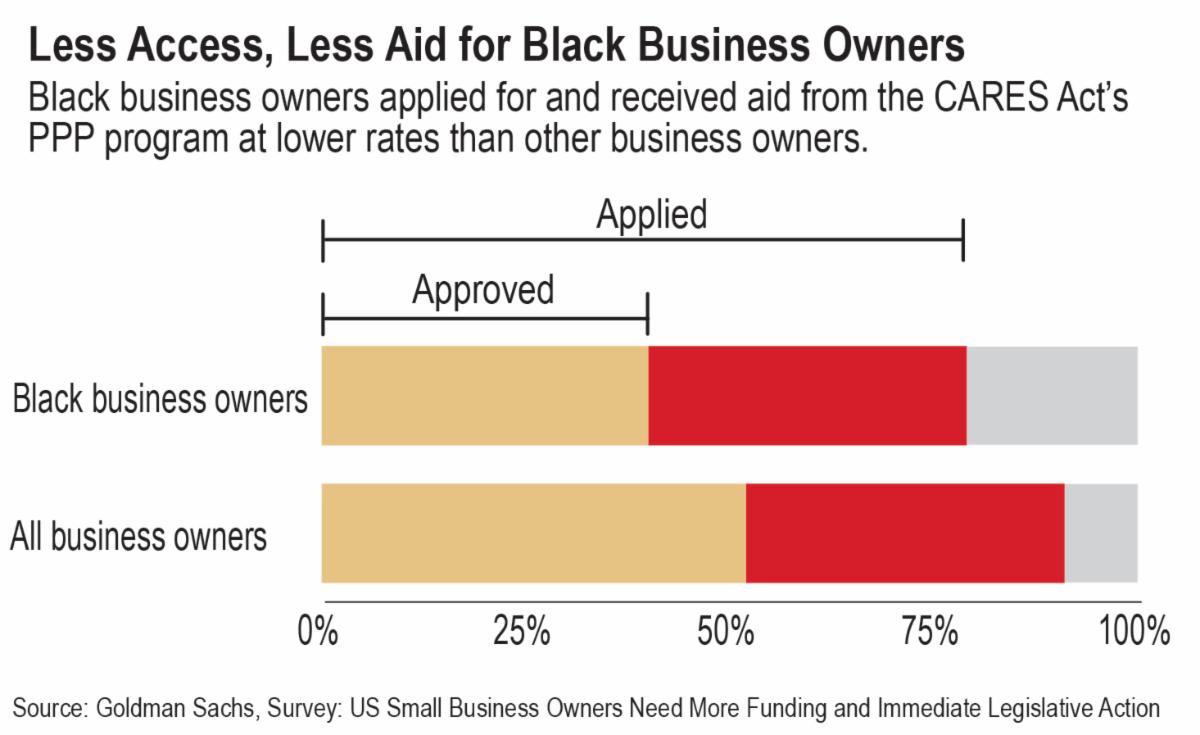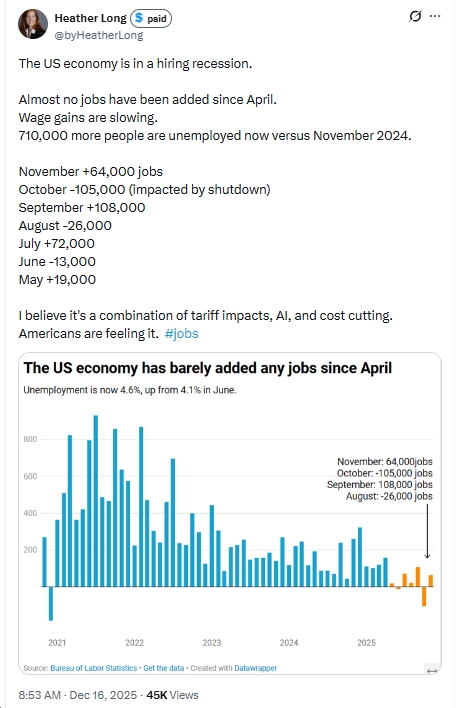From The Commonwealth Institute for Fiscal Analysis:
With economic activity beginning to rebound across the commonwealth and the country in May and June, the latest data show some improvements in employment. However, the situation is not improving for Black workers and business owners. Long-standing barriers to economic opportunity, a higher likelihood of working or owning a business in the industries most affected by the COVID-19 pandemic, and challenges to working from home have meant that the economic impact of COVID-19 is falling even heavier on Black workers and business owners. These same communities also face greater difficulty in accessing aid. As Virginia continues to navigate the many impacts of the COVID-19 pandemic, it’s essential that lawmakers prioritize the needs of Black workers and businesses, who face the greatest barriers and have been hardest hit by the current downturn.
Unequal Access to Income, Wealth, and Health-Related Benefits Place Black Households at Greater Risk
At the outset of the COVID-19 pandemic, unemployment in Virginia increased overall. But Black Virginians have long faced barriers to economic opportunity due to systemic exclusionary policies such as housing and employment discrimination, resulting in higher unemployment, lower income, and substantially less wealth than their white counterparts throughout history. In 2018, for instance, median household income for white households was 70% higher than for Black households. And Black households are more than twice as likely to be in poverty than white families who hold, on average, more than 5 times as much liquid assets as Black families do. Black workers are also typically paid lower wages — 73 cents, on average, for every dollar paid to a white worker. This has placed Black households in a more precarious position for dealing with the economic effects of the pandemic.
Even before the pandemic, in the first quarter of 2020, unemployment for non-Hispanic Black people in Virginia was already 1.1 percentage points higher than the unemployment rate for the rest of the population (3.7% compared to 2.6%). In the second quarter of 2020, the unemployment rate increased to 9.4% for the non-Black population, but rose to 11.1% for those who identified as non-Hispanic Black. [Note: this analysis is based on IPUMS Current Population Survey (CPS) microdata, which produces slightly different numbers for some months than state employment statistics published by the Bureau of Labor Statistics that also incorporate other data sources; however, the CPS microdata are the only timely and publicly-available source for sub-national employment data by race and ethnicity.]
There are also substantial differences in access to benefits such as health insurance, paid sick leave, and the ability to work from home. Just 58.7% of Black workers report that they have access to paid sick days, compared to 66.6% of white workers, and only 19.7% of Black workers, compared to 29.9% of white workers, report that they could work from home. The ability to stay home without fear of economic ramifications has become even more essential during the COVID-19 pandemic, when traveling to work can mean putting one’s health and safety in danger.
The combination of these factors has resulted in the pandemic having a particularly devastating impact on Black households, who don’t enjoy the economic buffer that allows white households to better cope with the economic hardships brought about by COVID-19.
COVID-19 Increasingly Exacerbating Pre-Existing Inequalities
As the pandemic drags on, Black workers continue to be at greater risk of being out of a job. After a 22.2 million drop in employment over March and April combined, total nonfarm U.S. employment rose by 2.7 million in May and another 4.8 million in June. But Black workers are not experiencing the positive effects of this economic recovery to the same degree. While the national unemployment rate fell from May to June for all demographic groups, Black unemployment remains particularly high at 15.4%, compared to 10.1% for white workers and 11.1% for all workers.
There is a similar trend in Virginia, with job losses slowing for white Virginians while increasing for Black Virginians. In mid-May, 30% of Virginia workers who were receiving unemployment insurance were Black, which is much higher than the share of all workers in Virginia who are Black (19%). Total jobless claims increased from April to May, and the percentage of those claims made by Black Virginians also increased, indicating that Black workers may be experiencing a growing share of new job losses. From late May to early July, weekly unemployment insurance initial claims in Virginia remained relatively stable overall, but fell by 15% for white filers and rose by 28% for Black filers. Not only did the number of Black filers increase, but the share of initial filers who identified as Black increased from 37.5% to 47.2% over that time period. This indicates that the pandemic continues to cause economic devastation for Black Virginians, even as conditions appear to be improving for white Virginians.

In addition to our country’s long history of obstructing the advancement of Black people through exclusionary policies, unique challenges facing Black communities may help to explain the unbalanced effects of the pandemic. Black workers accounted for 12.3% of the national labor force in 2019, but made up a greater share of employees in the retail trade, leisure and hospitality, and education and health services — three sectors that have been greatly impacted by COVID-19, accounting for just over half of the jobs lost in April.
Black workers are also less likely to be able to continue working from the safety of their homes due to technological barriers — the share of Black households with a computer in the home is 5% lower than for white households, and the share with a broadband internet subscription is 10% lower. Further, difficulties in accessing aid make it more difficult for Black households to recover from the economic downturn. Nearly 17% of Black households did not have a bank account in 2017, compared to just 3% of white households, which likely delays assistance, such as the CARES Act economic impact payment, for Black households.

The unbalanced economic effects of COVID-19 extend to Black-owned businesses as well. Black-owned businesses are highly concentrated in the industries with the largest job losses from the pandemic. The five most vulnerable sectors — including leisure, hospitality, and retail — make up 25% of the revenues of all U.S. businesses, but 40% of the revenues of Black-owned businesses. While the number of active business owners in the U.S. dropped by 22% from February to April, the number of Black business owners dropped by 41% — more than double the percentage of white business losses.
Even as Black business owners face especially severe economic impacts as a result of the pandemic, they are receiving less aid than the rest of the population. A lack of preexisting banking relationships has barred many Black business owners from accessing funds from the Paycheck Protection Program (PPP), which offers loans to small businesses to use for payroll costs, mortgage interest, rent, and utilities. According to one survey conducted in April, 79% of Black business owners have applied for a PPP loan, compared to 91% overall, and 40% of Black business owners have been approved for a PPP loan, compared to 52% overall. At a time when so many Black business owners are in desperate need of help, it’s critical that lawmakers work to provide greater access to aid.

Conclusion
As Virginia’s businesses begin to reopen and employment begins to trend upward, it’s important to recognize that the economic fallout of the pandemic is far from over. This is especially true for Black households that, due to a long history of policymakers erecting barriers to success and economic opportunity for communities of color, are less able to respond to job and revenue losses with the use of savings. Much more needs to be done both to help the hardest hit members of our community get through this particular crisis, and to make systemic changes to rebuild Virginia’s economy in a more equitable way. Access to paid family and medical leave, further cash assistance, and strengthened unemployment compensation can help Black workers and business owners begin to recover from the economic losses caused by the pandemic. And by advancing policies that address discrimination and break down barriers to education, good-paying jobs, wealth, and other means of economic opportunity, Virginia can rebuild a more equitable economy going forward.
— Morgan Ackley, Research Intern, and Laura Goren, Research Director
Print-friendly Version (pdf)
Learn more about The Commonwealth Institute at www.thecommonwealthinstitute.org



![Thursday News: “Europe draws red line on Greenland after a year of trying to pacify Trump”; “ICE Agent Kills Woman, DHS Tells Obvious, Insane Lies About It”; “Trump’s DOJ sued Virginia. Our attorney general surrendered”; “Political domino effect hits Alexandria as Sen. Ebbin [to resign] to join Spanberger administration”](https://bluevirginia.us/wp-content/uploads/2026/01/montage010826.jpg)













